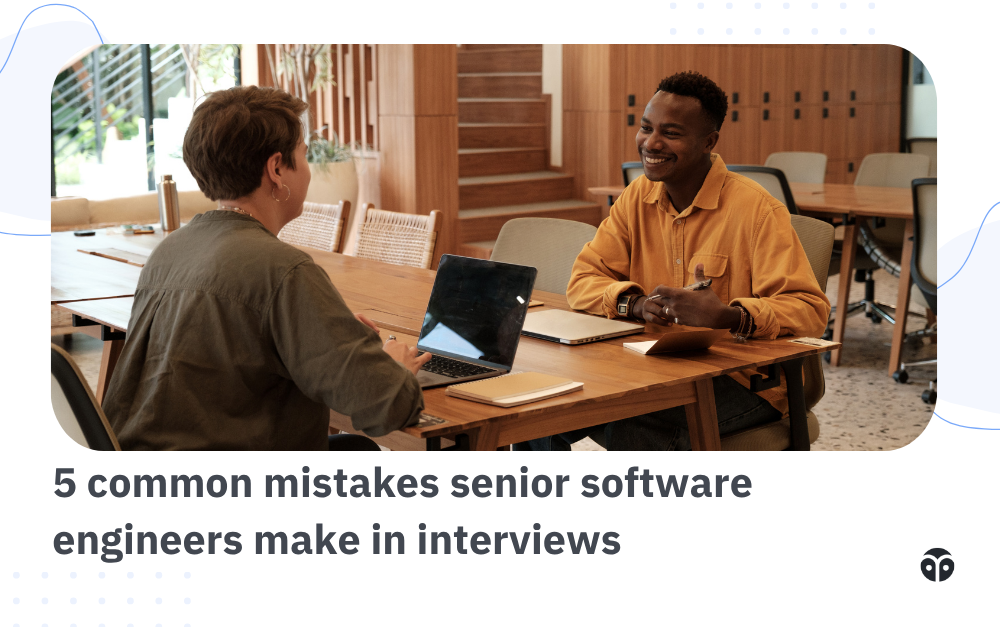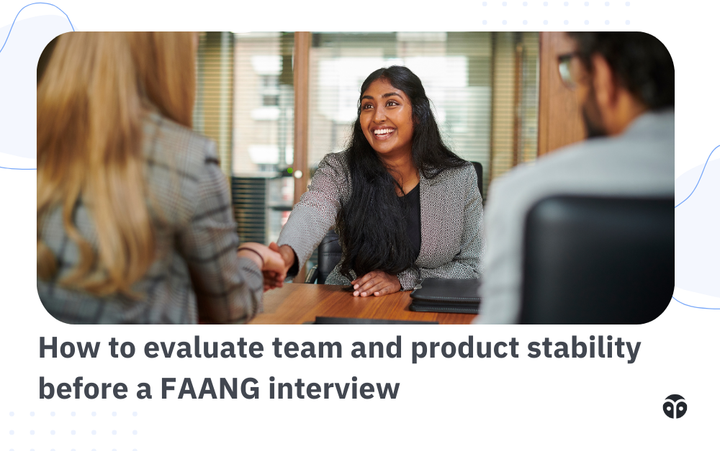5 common mistakes senior software engineers make in interviews
Senior engineer interviews test autonomy, communication, and judgment. Avoid these 5 common mistakes to stand out.

By the time you’re interviewing for a senior role, hiring managers already assume you can code. What they’re looking for is something different: whether you can operate independently, deliver meaningful outcomes without constant oversight, and communicate your thinking in a way that builds confidence across a team.
The challenge is that many engineers — even highly experienced ones — walk into interviews and underperform. Not because they lack skills, but because the way they approach the interview obscures those skills.
Over the years, we’ve seen the same mistakes trip up strong candidates again and again. Here’s how to avoid them.
How senior interviews differ from mid-level interviews
Before looking at the mistakes, it helps to understand how companies define senior. Every organization uses slightly different language, but the patterns are consistent:
- Mid-level engineers: deliver resilient projects. They can design, implement, and roll out features reliably, often with some guidance.
- Senior engineers: deliver solutions independently. They set milestones, make tradeoffs, and unblock themselves without constant oversight.
- Staff and above: shape strategy. They drive multi-team initiatives, influence roadmaps, and set technical direction over years.
That jump from mid-level to senior hinges on autonomy. A senior engineer is expected to take a fuzzy problem, scope it, seek the right context, and deliver results without their manager telling them who to talk to or how to start.
Interviews are designed to test exactly that. Whether it’s system design, coding, or behavioral rounds, the goal is to see how you handle the unfamiliar, how you unblock yourself, and how clearly you communicate in the process.
With that in mind, here are the pitfalls we see most frequently.
Mistake 1: Letting nerves derail performance
Strong engineers often stumble because nerves take over. Instead of calmly working through the problem, they freeze, rush, or fall into silence. We’ve watched candidates spot the bug in a debugging exercise and even fix it, but fail to explain anything about their process because anxiety short-circuited their ability to talk it through.
The underlying issue is mindset. Too many engineers approach interviews like exams: I need the right answer, and if I stumble, I’ve failed. That framing creates pressure and turns every misstep into a spiral.
How to avoid it:
- Reframe the interview as a work simulation. Treat it like pairing with a teammate, not defending yourself in front of a judge.
- Narrate your thinking. Even if you’re not sure, walking through your approach shows resilience and reasoning.
- Normalize nerves. Everyone feels them. The difference is whether you let them stop you from showing your process.
Mistake 2: Poor communication throughout the process
Many candidates assume communication matters only in the behavioral interview. In reality, every touchpoint is an assessment of how well you can work with others.
Recruiters, coordinators, and peers in technical interviews all provide feedback on the impressions they form when interacting with you. And in technical rounds, the ability to explain your reasoning is just as important as the code itself.
Interviews magnify small communication gaps. Silence while coding, vague explanations in system design, or skipping clarifying questions all leave interviewers guessing.
How to avoid it:
- Narrate your process out loud: what you’re testing, what you’re ruling out, what step comes next.
- Use the interviewer as a resource. Ask, “Would you expect X behavior here?” or “Can I assume Y about the system?”
- Practice explaining your thought process with peers—it should feel like guiding a teammate, not defending yourself.
Communication is not a separate skill track. It’s the throughline that ties every part of the interview together.
Mistake 3: Focusing on perfection instead of progress
One of the most common misconceptions we see is the belief that interviews are graded on optimality alone. Candidates walk out convinced they failed because they didn’t reach the best solution.
In reality, most interviewers care less about the exact solution and more about how you worked toward it. A candidate who makes steady progress, communicates tradeoffs, and engages with the interviewer is a stronger hire than one who silently grinds to the optimal solution but can’t explain their thinking.
How to avoid it:
- Start with a clear, working baseline. Then improve it if time allows.
- Signal tradeoffs explicitly: “This isn’t the most efficient version, but here’s why I’d start here, and here’s how I’d optimize.”
- Focus on demonstrating process over chasing perfection.
Progress and clarity consistently outweigh silent perfectionism.
Mistake 4: Failing to synthesize across interview stages
Another common pitfall is treating each interview as a silo. That mindset causes candidates to compartmentalize instead of showing the throughline.
At the senior level, the throughline matters most. Every stage is about whether you can take an ambiguous problem, break it down, and communicate your reasoning clearly. The format changes, but the skills don’t.
How to avoid it:
- Recognize the throughline: every stage is about how you break down ambiguity and collaborate to find solutions.
- Practice interviews that integrate multiple skills at once (e.g., coding while explaining design tradeoffs).
- Treat every interaction as an opportunity to show you can think clearly, speak clearly, and lead the problem to resolution.
Senior engineers should be consistently strong across contexts.
Mistake 5: Not showcasing independence and leadership
Perhaps the most important marker of a senior engineer is independence: the ability to take an initiative and deliver without constant hand-holding.
Too often, candidates underplay this. They speak in generalities about “working on a project” instead of highlighting how they scoped, drove, and unblocked it, or they fail to connect their work to broader business outcomes.
How to avoid it:
- Prepare 2–3 concrete stories of initiatives you led. Be ready to explain the scope, challenges, and business impact.
- Highlight moments of autonomy: how you identified next steps, engaged other teams, or kept momentum when things got stuck.
- Show leadership beyond code: mentoring, guiding mid-level engineers, or shaping cross-functional decisions.
Independence is the dividing line between mid-level and senior. Make sure your interview answers demonstrate it.
Shifting your mindset about senior interviews
If you take anything away, let it be this: you don’t have to prove that you’re flawless. You have to give your interviewers confidence in how you think, how you communicate, and how you’ll show up when the work is messy.
Those are skills you can practice long before you walk into the room.
Get holistic interview prep with Formation
The Formation Fellowship gives mid-level and senior engineering job seekers everything they need to land their dream roles — including personalized skill brush-ups, resume help, unlimited mock interviews with experienced software engineers and hiring managers from top-tier tech companies, career and negotiation support, and more.
If you’re having trouble navigating your job search on your own, apply here and get unconditional support from a team of engineering mentors, technical recruiters, career coaches, and more.



